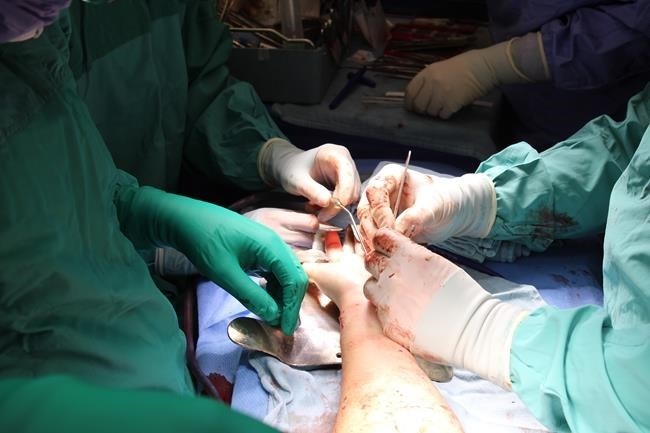
Doctors perform a hand transplant procedure at Toronto Western Hospital in Toronto in this undated handout photo. Canada's first hand transplant has been successfully performed by a team of doctors in Toronto.
Image Credit: THE CANADIAN PRESS/HO - University Health Network
January 13, 2016 - 7:00 AM
TORONTO - A group of Toronto doctors have successfully performed a hand and forearm transplant — the first in Canada — paving the way for the specialized procedure to be offered in the country.
The lengthy operation, which took place in Toronto, involved a 49-year-old woman who had lost her arm below the elbow in an accident several years ago.
"To the best of our knowledge, it is the first one for Canada," said Dr. Steven McCabe, who led the surgery at the Toronto Western Hospital. "It's not a breakthrough as far as doing a new operation, but it means that we have it available now here and that we have a capability of doing this procedure."
McCabe was part of a team in Louisville, Ky., that performed the world's first successful hand transplant in 1999. He returned to Canada three and a half years ago to become the director of Toronto Western Hospital's hand and upper extremity transplant program.
At that time, work towards carrying out Canada's first upper limb transplant was already underway at the University Health Network, which operates four of Toronto's major hospitals, including Toronto Western.
After a patient for the transplant was identified a rigorous series of tests were carried out, McCabe said.
"We have a very thorough medical, psychological and surgical evaluation to make sure that the procedure can have a good hope of working well. And also that the patients are safe to use the immunosupression medication and that they have good support throughout the transplant process," he said. "In this patient's case, it was probably more than a one-year process."
Surgeons also practised in a simulation facility prior to the actual procedure, McCabe added.
The transplant, which was performed earlier this month, took about 14 hours and involved 18 surgeons.
While the surgical techniques used were similar to what had been employed in the U.S. during the first such transplant, McCabe said improvements in the immunology field over time have increased the procedure's chances of success.
The transplant recipient, who is not being identified, is recovering well, but still doesn't have movement in her hand, McCabe said.
"The function of the hand transplant depends on regeneration of the nerves," he explained. "So we have transplanted the hand and reconnected the nerves. They will have to regrow into the muscles and into the skin ... to give the feeling."
No active motion in the woman's transplanted hand is expected for three to six months, and her hand will continue to improve for more than two years, McCabe said.
"Most patients will get back useful feeling and useful motion of their hand and they also have a tremendous sense of satisfaction with the regaining the sense of wholeness, which they can't get with a prosthesis," McCabe said. "That's hard for us to measure, obviously, but patients are typically very happy with that."
With the success of the first transplant, doctors in Toronto are already evaluating other patients who could be helped by the procedure, McCabe said.
To date, over 110 hand transplants have taken place worldwide in more than a dozen countries.
News from © The Canadian Press, 2016